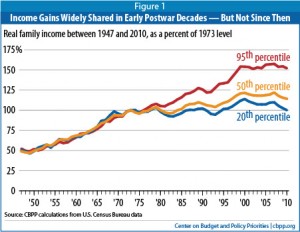Today’s NYT features a commentary by Nobel economist Joseph Stiglitz that makes a compelling argument related to his newest book The Price of Inequality.
The argument runs like this: The single greatest obstacle facing renewed American prosperity is the creation and widespread acceptance of massive income inequality because the latter has severe social, economic, and political costs that frustrate economic growth.
The social costs of inequality are well known and widely documented. Individuals with less education are less employed in the labor market and make less money as a result. Both these facts correlate with poverty and crime. Consider the price of the drug war. Every year the country spends billions of dollars on this war with no end, because every year more and more young (black) poor males grow up with restricted educational opportunities. The drug prohibition we are trying to enforce itself creates a black market that makes the drug trade highly lucrative: cash only and tax-free. As a result, we are under-investing in an unemployed army of workers whose only job prospects are in the drug trade, and as a consequence the life expectancy of black males is significantly less than their counterparts.
The economic costs of massive income disparity are becoming more evident as the gap between the wealthiest earners and the middle-class and poor grows wider. The data and trend are irrefutable, and no one can deny that growing inequality is a principle cause of many other social and political problems. The graph below represents real facts and figures and therefore speaks volumes for itself:

The political costs are also more evident as politicians who are funded by wealthy campaign contributors increasingly tailor both their legislative and policy priorities around the agendas of big business. The recent Supreme Court decision in Citizens United, holding that corporations are persons and for that reason can give nearly unlimited money to political causes and elected officials means simply that those with more dollars wield proportionally more influence. Consider this analysis of the 2012 Federal Election Commission study by Adam Lioz and Blair Bowie from the website Demos:
A new analysis of data through Election Day from the Federal Election Commission (FEC) and other sources by U.S. PIRG and Demos shows how big outside spenders drowned out small contributions in 2012: just 61 large donors to Super PACs giving an average of $4.7 million each matched the $285.2 million in grassroots contributions from more than 1,425,500 small donors to the major party presidential candidates.
Because of their wealth and the Supreme Court’s equation of money with speech, those very large donors are able to amplify their voices to more than 23,000 times the volume of an average small donor.
Stiglitz is a Nobel winning economist and hardly an ideological propagator of anything but the values of a free market system, sensibly constrained by democratic accountability in the service of fair and shared prosperity. Yet, he will be painted that way of thousands, perhaps millions, of Americans who prefer to believe a different story, one in which the poor are poor because of their own actions, the rich are rich because god intended it that way, and income inequality is natural. That story is a house of lies, and those who believe it and use it to justify their greed, incompetence, and vicious disregard of the lives of their fellow citizens must be pointed out and condemned for their foolish thinking.